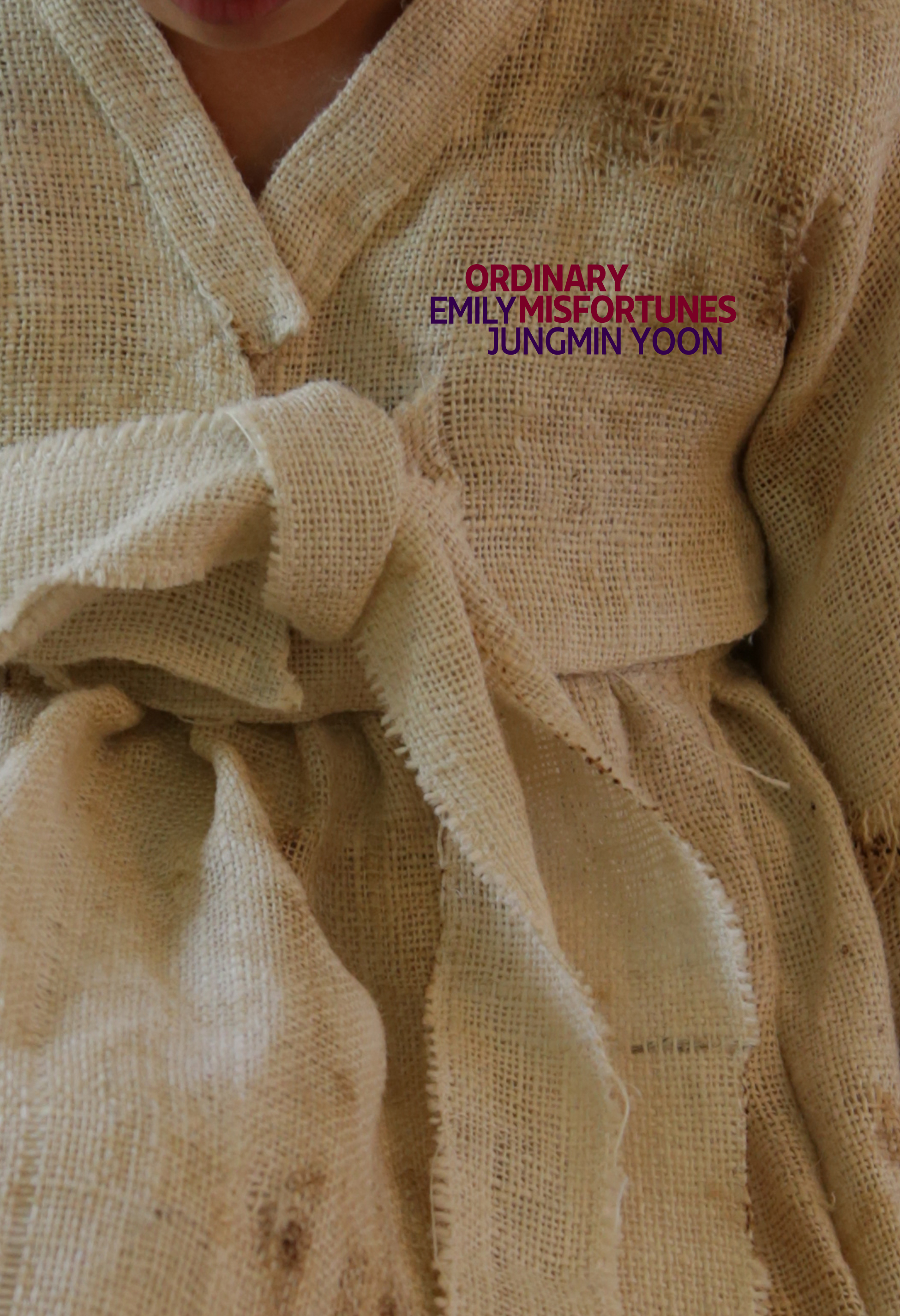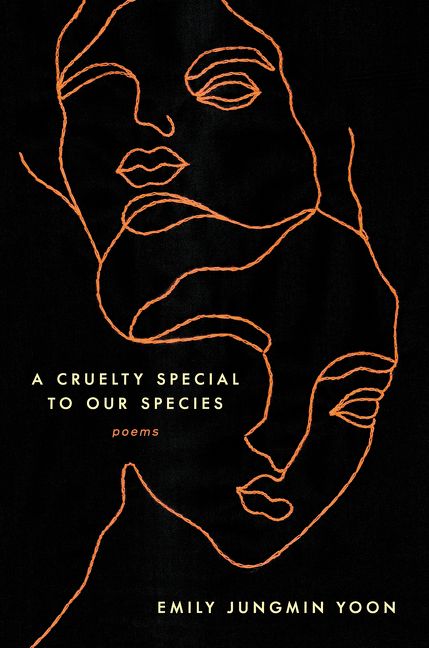A Review of Emily Jungmin Yoon’s Ordinary Misfortunes (Tupelo Press, 2017) and A Cruelty Special to Our Species (Ecco, 2018)
By Stephen Hong Sohn

First off, let me state that I thoroughly enjoyed reading Emily Jungmin Yoon’s Ordinary Misfortunes (Tupelo Press, 2017) and A Cruelty Special to Our Species (Ecco, 2018). I’m reviewing both titles partly because Ordinary Misfortunes is a chapbook, the majority of which appears in some form (revised or not) in A Cruelty Special to Our Species, a full-length poetry collection. It’s always interesting to think about the question of form and structure, especially when it comes to a chapbook and how it later will be included in a longer collection. Ordinary Misfortunes comes out of Tupelo Press, an independent publisher I have long adored; they have a number of Asian American collections they've put out, some of which I’ve taught (such as Barbara Tran’s In the Mynah Bird’s Own Words, which was part of a syllabus way back in the days I taught at Stanford). For those interested in Tupelo Press offerings, go here: https://www.tupelopress.org/
Ordinary Misfortunes is a chapbook primarily scaffolded by testimonial poems. Yoon takes inspiration from a set of oral histories concerning comfort women to generate a number of provocative and poignant dramatic monologues, each with the kind of specificity that honors the particularities and the tragedies of a given life. Take, for instance, “Hwang Keum-ju,” which begins with these lines: “a draft notice for girls, who was going to go? Everybody/ crying I went I dressed nicely and went/ train windows covered with tar paper/ None of the girls knew” (9). The poem ends with Hwang Keum-ju’s unlikely survival: “I was alone and walked all the way to the 38th parallel/ American soldiers sprayed me with so much DDT/ all the lice fell off me/ It was December 2nd/ I lost my uterus/ I am now 73 years old” (9). One element I can’t fully reproduce here is the spacing in between some of the words. Part of Yoon’s aesthetic approach to these dramatic monologue-ish poems is to emphasize the experience of fragmentation and partial recovery. The refraction of these lives into poetic art is never seamless. Instead, rupture and suture is part and parcel of how we must engage all of these testimonies.
Despite the darkness of the subject matter, what I find inspiring about these poems are their willingness to breathe such vitality into the lives of those who have been imperiled. The chapbook’s title, Ordinary Misfortunes, is the darkly ironic rendering of the ways in which traumatic histories become subsumed under pedestrian observations and considerations. Thus, beside the scorching testimonies, there are a set of repeated poems under the same title of “An Ordinary Misfortune” that together accrue deeper meaning under the guise of this naturalization and adaptation to a life imbued by trauma and violence. In some sense, what Yoon accomplishes in her testimonial poems is exactly the opposite, such “extraordinary fortunes”: they make exceptional the lives of these women, to clarify the bounty that we are given in their oral histories, the reminder of what cannot remain unrecognized.
This project of recovery is taken up on a larger scale in A Cruelty Special to Our Species (Ecco, 2018). Yoon provides us with a lengthy author’s note up front, explaining that the “poems on the ‘comfort women’ of the Japanese Empire are the heart of this collection” (xi). Yoon goes on to state that her poetry serves to “amplify and speak these women’s stories, not speak for them” and that she reminds “readers that even if a part of history may not seem to be relevant to their lives, it is—it is their reality too” (xi). Indeed, the testimonies from comfort women that also appear in Ordinary Misfortunes come to be the cornerstone of the longer collection, though there is a wider diachronic character to A Cruelty Special to Our Species, a fact perhaps made most evident in the jacket flap blurb offered by Vijay Seshadri, who sees this work through its “[h]istorical traumas—specifically, the trauma inflicted on women who are seen as the spoils of war; and, generally the trauma of the Korean peninsula.”
The opening, “An Ordinary Misfortune,” gives us this diachronic or polychromic perspective through the lyric subject, who appears as a contemporary figure, giving us access to this larger historical traumas of the Korean peninsula. The lyric speaker finds herself on a “jam-packed train,” having to endure different perspectives on Korea, including “Your life in Korea would have been a whole lot different without the US. Meaning: be thankful” (3). In the second iteration of “An Ordinary Misfortune,” our lyric speaker makes explicit her personal connection to historical trauma, as her grandmother appears as a subject imperiled by male predation in Korea. As the lyric speaker notes, “What is right in war. What is left in war. War hasn't left Korea. I have. I fold. I give up, myself, to you” (6). This perspective, that “War hasn’t left Korea,” is one that is expanded upon in following poems. Indeed, the “unending war,” as it has been called by Christine Hong, presents itself the shadow over which these poems find their weighty centers. Poems such as “Hello Miss Pretty Bitch,” “Don’t Touch Me,” and “Obeli,” are especially notable for their ability to remind us that Korea and the unending war continue to influence representational terrains and our contemporary moment.
Though I can’t go into detail about every single thread that Yoon weaves through A Cruelty Special to Our Species, I will bring up the element of the title, which gestures to the boundaries between human and animal, and the problematic power structures that determine which lives should be saved and which should be discarded. “Bell Theory” perhaps clarifies this issue most provocatively, as the lyric speaker details a thorny experience in the classroom when she is just a young child. Her classmate asks her if she eats dogs, a question that has been levied at Koreans before. But, this question gives way to an extraordinary sequence involving “A Cruelty Special to our species” (37), in which the “the colonized… use the chaos/ of the Kanto Earthquake to poison waters, set fire” (37) to determine a dividing line between the human and the subhuman, and to delineate who would be massacred.
In the context of Japanese colonialism, what becomes rendered as animal is none other than the Koreans, who become targets of mob violence following the earthquake. Koreans were erroneously believed to have tainted the drinking water. This comparison point and context gains further texture through other poems, such as “Transformation” and “Time, in Whales.” The lyric speaker continually places herself in relation to whales, at one point even suggesting a potential transformation across species. Thus, the collection achieves an intriguing ecopoetic impulse with these poems precisely because the issue of the entity that “poisons waters” is continually marked as the figure who has become corrupted by power. Despite the targeting of disempowered entities, Yoon collection ends with an ethos of resistance, the possibility that water will rise, that it can be brought to a boil: “And yes, in grace. Only song, only buoyancy” (67), the sense that there can be something else that comes to the surface, even after such destruction.
Buy the Books Here and Here.
Review Author: Stephen Hong Sohn
Review Editor: Gnei Soraya Zarook
If you have any questions or want us to consider your book for review, please don’t hesitate to contact us via email!
Prof. Stephen Hong Sohn at ssohnucr@gmail.com
Gnei Soraya Zarook, PhD Student in English, at gzaro001@ucr.edu